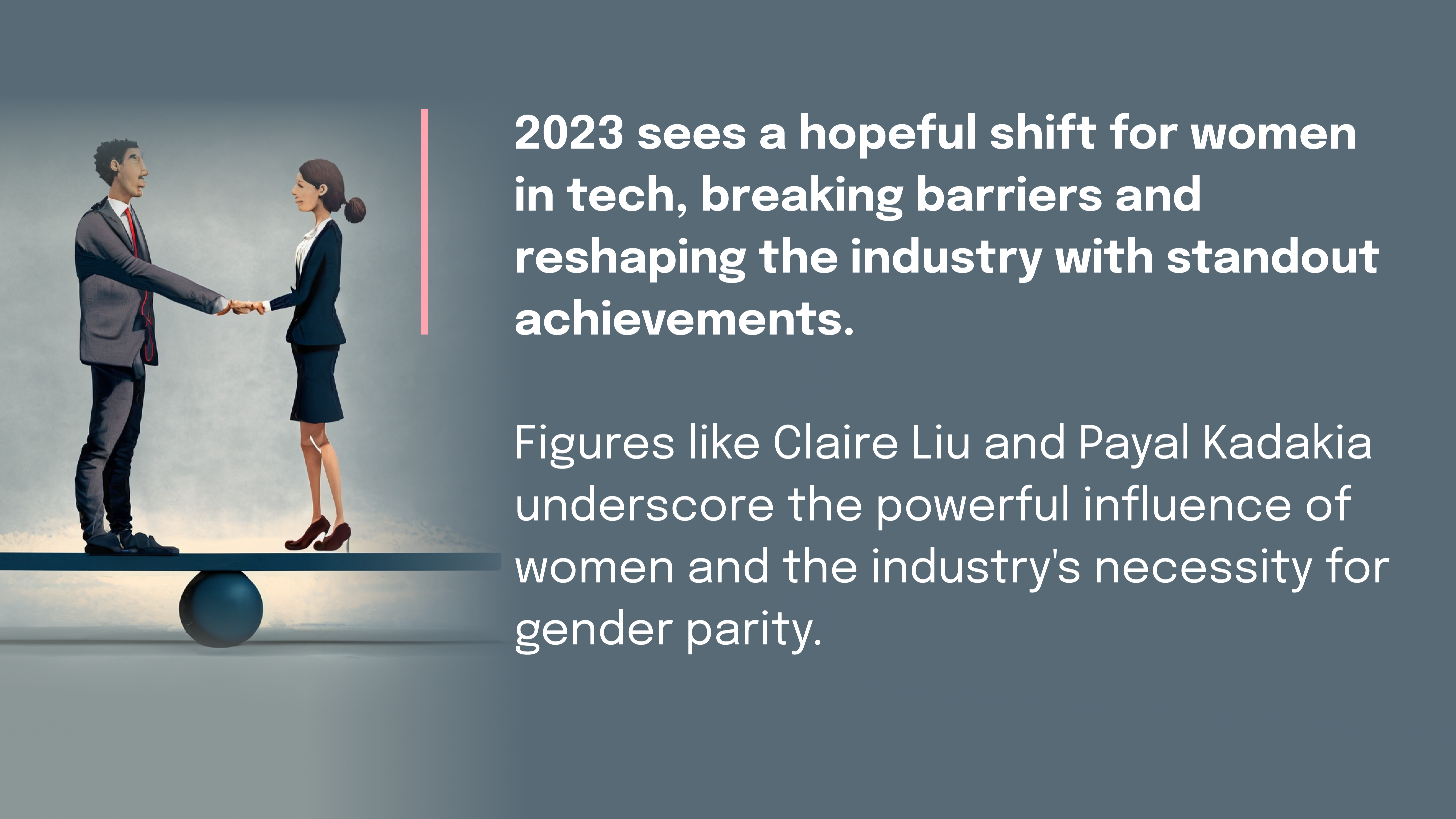In an era characterized by technological dynamism, the conspicuous gender gap in the tech industry remains a persistent quandary, especially in leadership and management roles. However, since the turn of the year, the industry has seen a significant tide of change washing over this traditionally male-dominated landscape . This shift symbolizes crucial strides towards empowering women, fostering an industry primed for diversity, innovation, and sustainable growth.

The Longstanding Inequality: A Closer Look
Unfortunately, the tech industry, a catalyst for global development, remains afflicted by stark gender disparity. As a 2022 PwC report illustrates, women comprise just 27% of the worldwide tech workforce—a sobering testament to the systemic challenges women face in accessing and excelling in tech roles. This persistent disparity is more than a social injustice; it hampers the industry's innovative potential and undermines collective progress.

Hurdles in the Path: Unpacking the Barriers Women Face in Tech
To understand the gender imbalance in tech, we need to delve deeper into the multifaceted barriers obstructing women's entry and progression. Gender biases remain deeply entrenched, often subtly influencing hiring practices, team dynamics, and career progression trajectories. Representation, too, is a stumbling block—with few women in tech leadership roles, aspiring professionals lack the role models and mentors crucial for career advancement.
Perhaps one of the most disquieting issues is the gender pay gap. Microsoft’s 2023 report reveals that women in tech earn only 82 cents for every dollar earned by their male counterparts. This wage discrepancy is a poignant reflection of the deep-seated inequities that continue to mar the industry.

Empowerment in Action: The Rise of Women in Tech in 2023
Despite these formidable obstacles, 2023 marks an era of change and burgeoning optimism. A rising tide of women is carving out their niches, smashing glass ceilings, and reshaping the contours of the tech industry.
Consider Claire Liu, the youngest female CEO in Silicon Valley, who has catalyzed remarkable advancements in AI technology. Or Payal Kadakia, the dynamic founder of ClassPass, who has harnessed digital platforms to revolutionize the fitness industry. Their success stories underscore the transformative power of women in tech and the industry's urgent need for gender parity.

The Power of Diversity: Why Gender Balance Matters in Tech
As industry leaders, it is incumbent upon us to recognize the immense value that women bring to the tech sphere. Evidence shows that gender-diverse teams are more innovative and productive, and generate superior financial returns.
A 2020 study by BCG revealed that diverse management teams generate 19% higher revenues due to increased innovation. In 2023, we can no longer afford to ignore the powerful correlation between diversity and business success.
Corporate Activism: Fostering Equality and Empowerment in Tech
In 2023, numerous corporations have pledged to rectify gender imbalances, fostering inclusive cultures that empower women. IBM, for instance, has unveiled a groundbreaking policy offering 12 weeks of parental leave to both mothers and fathers, while Salesforce has implemented regular pay audits to mitigate wage disparities.
Moreover, mentorship programs are being championed to foster a supportive environment for women. Tech companies such as Intuit and Adobe proactively curate mentorship programs, connecting emerging female tech professionals with seasoned industry leaders.
Policy Influence: Regulatory Efforts Bridging the Gender Gap
Alongside corporate endeavors, policy initiatives are pivotal in advancing gender equality in tech. The 2023 European Commission's Gender Equality Strategy mandates a 40% female quota in non-executive director positions in publicly listed tech companies. This legislation and others propel significant strides toward a more equitable tech landscape.
A Vision for the Future: Empowerment-Driven Strategies and Insights
Looking ahead, we must focus on sustainable, systemic changes. These include educational initiatives encouraging girls to pursue STEM, corporate policies ensuring fair representation and pay, and societal shifts in attitudes towards women in tech.
Industry leaders, let us strive to be the catalysts for change. We have the power—and the responsibility—to drive this transformation, fostering a tech industry defined not by gender but by talent, innovation, and collective progress.
As we move forward, we must remember that empowering women in tech is not just about achieving parity—it's about harnessing the full spectrum of human potential to fuel a more innovative, inclusive, and prosperous future. The promise of 2023 is merely the beginning; let's carry this momentum onwards, championing gender equality as the industry norm, not the exception.
References:
-
PwC. (2022). "Women in Tech: Time to close the gender gap". PwC Global. https://www.pwc.com/gx/en/diversity/women-in-technology.html
-
Microsoft. (2023). "Gender Gap in Tech: An Annual Report". Microsoft Research. https://www.microsoft.com/en-us/research/publication/gender-gap-tech-annual-report-2023/
-
BCG. (2020). "How Diverse Leadership Teams Boost Innovation". Boston Consulting Group. https://www.bcg.com/publications/2018/how-diverse-leadership-teams-boost-innovation
-
European Commission. (2023). "Gender Equality Strategy 2023". European Commission. https://ec.europa.eu/info/policies/justice-and-fundamental-rights/gender-equality/gender-equality-strategy_en
-
IBM. (2023). "Our Commitment to Equality". IBM Policies. https://www.ibm.com/policies/equality/
-
Salesforce. (2023). "Equal Pay for Equal Work". Salesforce Newsroom. https://www.salesforce.com/news/stories/equal-pay-for-equal-work
-
Intuit. (2023). "Mentoring Women in Tech". Intuit Blogs. https://www.intuit.com/blog/mentoring-women-in-tech
-
Adobe. (2023). "Women at Adobe". Adobe Blog. https://blog.adobe.com/en/topics/women-at-adobe.html